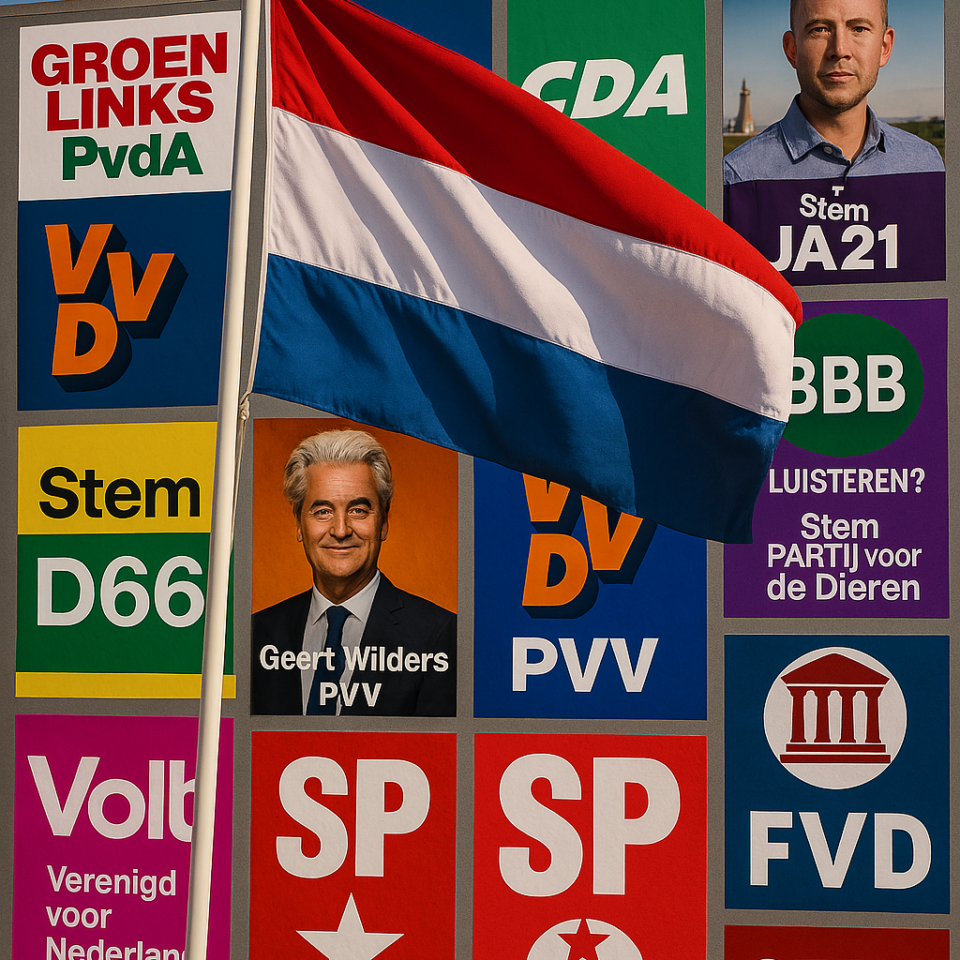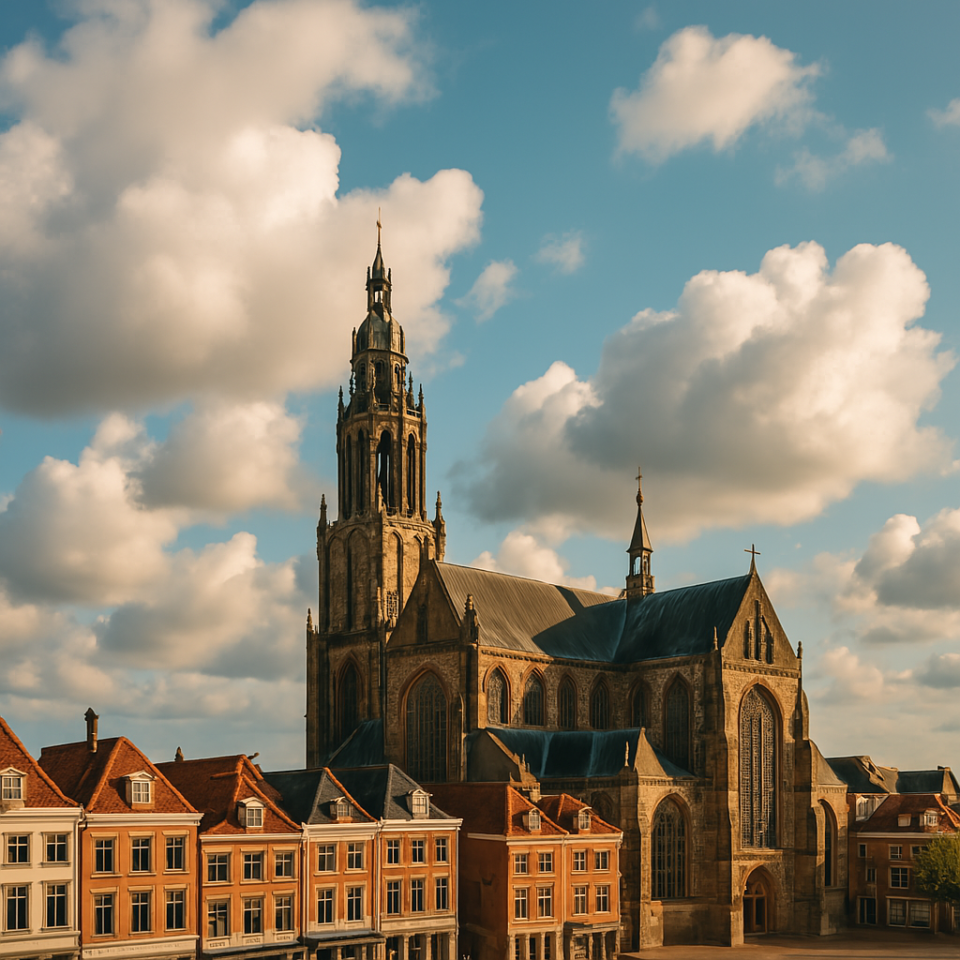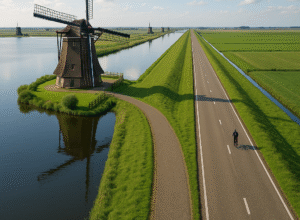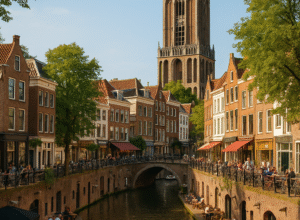No Two-Party Drama Here: A Look at Dutch Politics from an American Expat
When I first started trying to understand Dutch politics, I thought: Sure, how complicated can it be? There’s a king, a prime minister, some kind of parliament—it can’t be worse than U.S. politics, right?
Then I looked into how elections work here.
There are dozens of political parties. Some with names like “Party for the Animals” and “50PLUS.” I haven’t seen a ballot myself (as a non-citizen, I can’t vote in national elections), but just reading about it felt like ordering off a very ideologically diverse menu. Still, the more I learned, the more I realized: this system makes a weird kind of sense. And in some ways, it might just work better than what I left behind.
The Dutch Political System in a Nutshell
The Netherlands is a constitutional monarchy with a parliamentary democracy. That means they have a king (King Willem-Alexander, if you’re curious), and while he’s definitely not without responsibility, he mostly waves at people and signs things ceremonially. The real political power lies in the hands of parliament—specifically the House of Representatives (Tweede Kamer).
There are 150 seats in the Tweede Kamer. And they are filled proportionally—meaning if a party wins 10% of the national vote, they get 10% of the seats. No weird electoral college math. No gerrymandering. Just straight-up math. (Imagine!)
No Two-Party System Here
This proportional system means that many parties can—and do—win seats in parliament. It’s normal for 10 to 15 parties to be represented at once. This forces cooperation, compromise, and coalition governments.
No single party has held a majority in over a century. So, after every election, parties negotiate coalitions to form a government. It’s like political speed dating followed by a long group project.
A (Very) Quick Guide to Dutch Political Parties
Here’s a quick tour of some of the bigger players, from left to right on the political spectrum:
-
GroenLinks–PvdA (GreenLeft–Labour) – Progressive, left-wing, pro-environment, pro-EU. Recently merged to strengthen their position.
-
D66 (Democrats 66) – Social-liberal, pro-education, pro-EU, big on civil rights.
-
Volt – A pan-European party. Young, idealistic, and pro-integration within the EU.
-
CDA (Christian Democratic Appeal) – Center-right, Christian democratic, traditional but pragmatic.
-
VVD (People’s Party for Freedom and Democracy) – Liberal-conservative, pro-business, led for years by Mark Rutte.
-
NSC (New Social Contract) – A new centrist party focused on transparency and trust in government.
-
BBB (Farmer-Citizen Movement) – Agrarian populist party that exploded in popularity recently, especially outside urban areas.
-
PVV (Party for Freedom) – Right-wing populist and anti-immigration, led by Geert Wilders.
-
JA21 & FvD (Forum for Democracy) – Hard-right to far-right, with nationalist and Euroskeptic positions.
-
Partij voor de Dieren (Party for the Animals) – Yes, they’re serious. Environmentalist and animal rights focused.
-
50PLUS – A party dedicated to the interests of older citizens.
There’s also BIJ1, a left-wing party focused on anti-racism and intersectionality, and SGP, a deeply conservative Calvinist party that still believes women shouldn’t run for office (yet holds a seat in parliament because democracy is weird like that).
How It Compares to U.S. Politics
Oh boy. Where do I start?
-
More parties = more nuance. In the U.S., we tend to lump everything into Team Red or Team Blue. Here, you can find a party that reflects your views much more specifically. That means more voices in parliament—but also more compromise.
-
Coalitions are the norm. No one “wins” outright. Governments are built by negotiation, and often include parties that don’t fully agree. It’s messy, but it can result in more balanced policies.
-
Politics feels… less angry. Not always, of course—Wilders’ rhetoric is intense—but overall, political discourse is less tribal, and media is less obsessed with constant outrage.
-
Voter turnout is higher. Not astronomically, but higher. And elections are much less influenced by money. Campaigns are short, publicly funded, and no one’s airing attack ads for months on end.
The Netherlands in the EU
The Netherlands is one of the EU’s founding members and a vocal supporter of European integration. Most major parties (except the hard-right) are pro-EU, and Dutch politics regularly intersect with broader EU debates—on agriculture, migration, climate policy, and the economy.
The Dutch approach to the EU is often practical: they want efficiency, fairness, and shared values—but they’re not afraid to speak up when they disagree (especially when it comes to budget rules or subsidies).
So… Who’s in Charge Right Now?
As of July 2, 2024, the Netherlands has a new coalition government, known as the Schoof cabinet. This coalition comprises the Party for Freedom (PVV), the People’s Party for Freedom and Democracy (VVD), New Social Contract (NSC), and the Farmer-Citizen Movement (BBB).
The government is led by Prime Minister Dick Schoof, an independent politician and former civil servant. It’s the first time since 1918 that an independent has held the role of Prime Minister in the Netherlands.
This coalition came together following the 2023 general election, where the PVV, led by Geert Wilders, secured the most seats. Coalition negotiations took months (as is typical here), and the agreement—titled “Hope, Courage, and Pride”—was presented on May 16, 2024.
Despite internal tensions, including the resignation of a junior minister in late 2024, the government has held together—so far.
You can read more here:
What It’s Like as an American Expat
It’s honestly refreshing.
I don’t feel like I’m stuck in a forever tug-of-war between two parties that barely represent me. I’m not constantly bracing for the next media firestorm. And no one here cares if I stand for a flag or say the right prayer before a school board meeting.
Politics still matters. Passionately. But it’s not performative in the same way.
Living in the Netherlands reminds me that there are other ways to do democracy—ways that are slower, more collaborative, and sometimes… a little boring. And boring is underrated.
Conclusion: More Voices, Less Noise
Dutch politics isn’t perfect—no system is—but it’s built on a foundation of inclusion, negotiation, and realism. There’s room at the table for more than two teams. And while that can make things complicated, it also reflects the complexity of real life.
So no, there’s no two-party drama here. Just a bunch of people trying to make democracy work, one coalition at a time.








